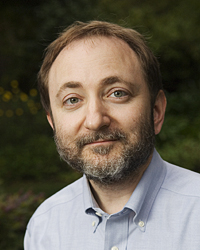Andrew Fire

Andrew Zachary Fire (born April 27, 1959 in Palo Alto, California) is an American biologist. He is a professor of pathology and genetics at Stanford University School of Medicine. Fire was given the 2006 Nobel Prize in Physiology or Medicine for the discovery of RNA interference. The research was conducted at Carnegie Institution for Science and published in 1998.
Education
[change | change source]Fire completed high school at age 15. He wanted to study at Stanford University, where he would later work, but was not accepted.[1] He studied at the University of Californiaat Berkeley. Fire graduated with a bachelor's degree in mathematics at 19, and earned a PhD from the Massachusetts Institute of Technology (MIT) in 1983.[2]
Nobel prize
[change | change source]In 2006, Fire and Craig Mello shared the Nobel Prize in Physiology or Medicine for work first published in 1998 in the journal Nature.[3] The paper reports that tiny snippets of double-stranded RNA (dsRNA) effectively shut down specific genes, and so caused the destruction of messenger RNA (mRNA) with sequences matching the dsRNA. As a result, the mRNA cannot be translated into protein.
Fire and Mello found that dsRNA was much more effective in gene silencing than the previously described method of RNA interference with single-stranded RNA. Because only small numbers of dsRNA molecules were required for the observed effect, Fire and Mello proposed that a catalytic process was involved. This hypothesis was confirmed by later research.
The Nobel Prize citation, issued by Sweden's Karolinska Institute, said: "This year's Nobel Laureates have discovered a fundamental mechanism for controlling the flow of genetic information". The British Broadcasting Corporation (BBC) quoted Nick Hastie, director of the Medical Research Council's Human Genetics Unit, on the scope and implications of the research:
- "It is very unusual for a piece of work to completely revolutionise the whole way we think about biological processes and regulation, but this has opened up a whole new field in biology".[4]
References
[change | change source]- ↑ "Andrew Fire shares Nobel Prize for discovering how double-stranded RNA can switch off genes - Nobel Prize - Featured Topics - Stanford University School of Medicine". med.stanford.edu. 2011. Archived from the original on January 8, 2011. Retrieved March 29, 2011.
- ↑ "MIT alum shares Nobel Prize in physiology". web.mit.edu. October 2, 2006. Retrieved March 29, 2011.
- ↑ Fire A.; Xu S.; Montgomery M.; Kostas S.; Driver S.; Mello C. 1998. Potent and specific genetic interference by double-stranded RNA in Caenorhabditis elegans. Nature 391 (6669): 806–811. Bibcode 1998Natur.391..806F. DOI:10.1038/35888. PMID 9486653
- ↑ "Nobel prize for genetic discovery". BBC. 2006-10-02. Archived from the original on 4 October 2006. Retrieved 2006-10-02.
| International | |
|---|---|
| National | |
| Academics | |
| Other | |
Text is available under the CC BY-SA 4.0 license; additional terms may apply.
Images, videos and audio are available under their respective licenses.
